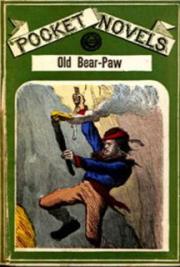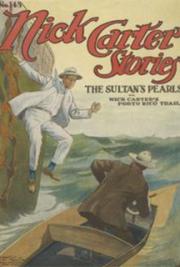CHAPTER IX.
THE LAST CALL.
Twenty minutes later found Nick Carter seated in the chemist’s laboratory, not only seated there, but tied hand and foot with stout cords and securely bound to his chair.
His companions were the four men by whom he had been held up—precisely as he had expected to be.
There was only one other occupant of the room—Patsy Garvan.
He was lying on the floor in one corner, insensible from a drug administered by Busby the previous night.
Margate had removed his disguise and tossed it upon the table. That he had the famous detective helplessly in his power, he had not the shadow of a doubt. It had impelled him to do what he had done the night before, when talking with Patsy Garvan—to vaunt his evil exploits, to boast of what he was about to accomplish, to express his vicious hatred of his hearer, and much that he had said to Patsy, he now had said to Nick.
Not one of his confederates had ventured to interfere.
Aside from his surprise at beholding Margate, whose identity he really had not suspected, the effect of all that the rascal had been saying was not manifest in the detective’s face. He had appeared as unmoved and severe as a man of bronze while he mutely listened.
Not until Busby began to growl with impatience, whereupon Margate seemed about to end the scene, did Nick take steps to prolong it, knowing well what soon must occur.
“Get Clayton’s fortune, eh?” he then remarked, picking up a prediction Margate had just made. “So that has been your game, much in line with what you twice have attempted. Do you expect to meet with more success this third time, Margate, that you have declared yourself so boldly?”
Margate laughed derisively and pointed to the senseless form of the detective’s assistant.
“Does that, with your own situation, look like success?” he questioned, with a mocking sneer. “Oh, I’ve got you this time, Carter, and there is no loophole through which you can escape. You undertook last night to trap me with a ruse, but I have turned the tables on you. I have you where I want you, where I long have wanted you, and, as for the game I am playing—well, I shall make good. I will stake my life upon that.”
“Your life may be the price, Margate.”
“Not through your agency, Carter.”
“You evidently have overlooked one danger with which you are menaced,” Nick said sternly.
Margate’s brows knit quickly.
“What is that?” he demanded.
“The murder of Doctor Thorpe.”
“Rot! That cuts no ice.”
“No?”
“You have dug into that in vain, Carter. You can make nothing of it. You could form no theory consistent with the circumstances. I have been sure of that from the first.”
Nick thought of this man’s mother, of her terrible secret, of the trust she had reposed in him, and he withheld the words that would have caused Margate’s evil heart to have sunk like lead. He said simply, yet impressively:
“I know more, Margate, than I did at first.”
“What do you imply by that?” snapped Margate suspiciously.
“I think I now can guess why Doctor Thorpe was killed, and also prove who killed him.”
“Rot! What theory have you now formed?”
“Madame Clayton telephoned to me, Margate, just before the fatal shot was fired. I heard her voice and the report of the weapon.”
“But she spoke only your name,” Margate impulsively cried. “I’m sure of that, and——”
“Stop!” Nick sternly interrupted. “You could not be sure of it, could not possibly know it—if you had not been there.”
Margate recoiled with a scowl.
“You see that you betray yourself, Margate, if that were necessary,” Nick quickly added. “But it is not, Margate, since I now can guess precisely what occurred and what caused the crime.”
“You can, eh?” Margate’s voice took on a husky harshness.
“Easily,” snapped Nick, more sharply. “Madame Clayton saw by chance that scar on your head, probably that very evening, and she suspected your identity. That must have been after her son and his wife left the house. Doctor Thorpe called only incidentally, presumably to see Clayton. Burdened with her terrible discovery, she confided your criminal career and her consequent fears to the physician, and he advised her to call me by telephone and confer with me. She attempted to do so, and you, returning home and approaching the open French window at the time, and apprehending that your present knavish game would be thwarted—you shot him to prevent his revealing what the woman had told him. You then overcame her, or she may have fainted, and you drugged her and threw her into the condition in which I found her, bent upon keeping her so till you could carry out your designs upon Clayton. You planted the evidence that I found, and you since have had the woman’s nurse in your employ. That, Margate, is how and why it was done. There is little need to add to these details, little to assert that they are true, and that——”
Nick broke off abruptly.
Busby’s wife had appeared at the laboratory door.
Margate swung round like a flash, with his ghastly face showing plainly how near Nick had come to the truth. He started up, crying harshly:
“Why are you here, Nancy? What do you want? Leave us to send these infernal sleuths to perdition.”
Nancy Busby did not fear him.
“I’m here with a reason,” she retorted. “There’s a man at the front door to see you.”
“See me?” cried Margate, staring. “What man?”
“He says his name is Peterson, and as how he’s got a message for you.”
Nick Carter’s face did not change by so much as a shadow.
“Peterson!” Margate spoke, with a gasp. “Don’t be alarmed, mates. He’s the house butler. He must have seen me coming here, or this way. Wait while I see what he wants.”
“He will not keep you waiting long,” thought Nick, with grim satisfaction.
Margate had hurriedly replaced his disguise, and he now hastened to the front door and opened it.
Peterson stood bowing on the steps, sedate and solemn, but with an unusual gleam in his eyes.
“Why are you here, Peterson?” Margate demanded, governing his voice with an effort. “What do you want?”
“Well, Mr. Garside, sir, it’s like this,” Peterson deliberately explained. “I want, Mr. Garside, sir, a hand in the game you are playing, and a bit of the stake.”
Other figures, with weapons drawn, were stealing nearer the door, hugging the wall of the house.
“If I’m not to have it, Mr. Garside, sir—I want you, instead!”
Peterson rang out the last with a voice that Margate remembered only too well, the voice of the man who had sent a bullet at his head long months before. And Peterson’s revolver leaped from his pocket and covered the staggering crook.
“Heavens above!” Margate gasped, while reeling. “Chick Carter!”
Then the fiend in him arose supreme, or in his brain a maddening vision of the electric chair. With a fierce shriek, regardless of the weapon, he leaped at Chick Carter’s throat.
Chick met him halfway and tried to grapple him and avoid shooting him, but the weapon was discharged almost on the instant.
Margate’s muscles went lax, his knees gave way under him. He uttered one groan, with head drooping, then fell from the detective’s arms and rolled down the stone steps, shot through the heart.
“This way, boys!” Chick shouted, dashing through the hall. “Nail every man.”
There was little need to thus instruct the half dozen officers who were following him—and little need for their display of weapons. For when they poured into the laboratory, the three dismayed crooks threw their hands into the air, nor lowered them save for the manacles.
The two women, Busby’s wife and Martha Dryden, were secured a little later, and one and all subsequently received long prison terms for their crimes.
One alone, Dave Margate, had gone to a higher tribunal for punishment.
In view of Nick Carter’s deductions, which covered most of the ground, together with what had passed between Patsy and Margate, but little need be added to these closing pages.
Patsy was quickly revived with an antidote, grimly supplied by Busby after he found himself under arrest, and the young detective was none the worse for his experience.
Madame Clayton was found in an upper room, still unconscious. But she afterward was restored and entirely recovered, when her story of the murder confirmed the conclusions at which Nick already had arrived. Her secret died with her recreant son, for the detective’s lips were forever sealed, and others never knew of the twin relationship.
Nick Carter slipped in enough fiction to form a consistent story, in his report of the case, and Mr. Chester Clayton, nor the public, never knew the whole truth. It was better so, far better—and so it may be left.
THE END.







